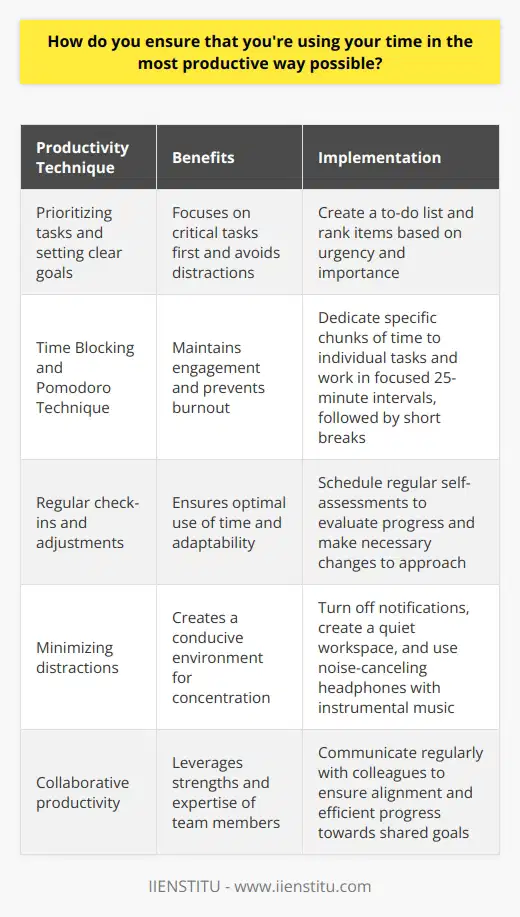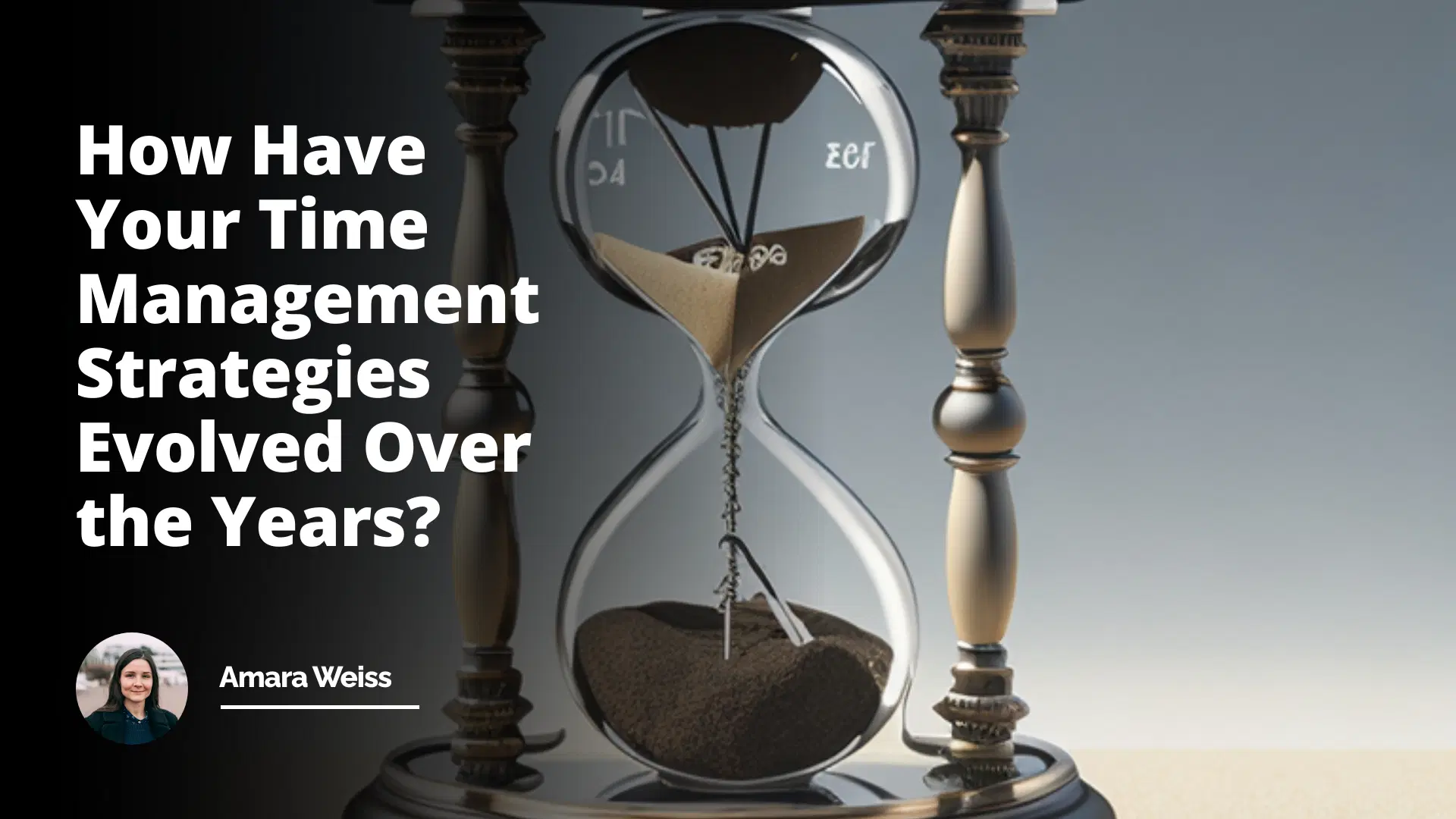
Over the years, my approach to time management has undergone a significant transformation, shaped by personal experiences, professional challenges, and the ever-evolving landscape of work. When I first stepped into the professional world, fresh out of college, my time management strategy was rudimentary at best. Armed with a simple notepad and a pen, I would jot down my daily tasks, crossing them off one by one as I completed them. It was a straightforward system, but it lacked the depth and sophistication needed to tackle the complex demands of a growing career.
As I progressed in my role and took on more responsibilities, I quickly realized that my basic to-do list was no longer sufficient. I found myself overwhelmed, constantly juggling multiple projects and deadlines, and struggling to prioritize effectively. It was a wake-up call, a stark reminder that I needed to adapt and evolve my time management approach.
Determined to improve, I began researching various time management techniques and philosophies. I came across the Eisenhower matrix, a simple yet powerful tool that helps prioritize tasks based on their urgency and importance. The matrix, named after President Dwight D. Eisenhower, divides tasks into four categories: urgent and important, important but not urgent, urgent but not important, and neither urgent nor important (Covey, 1989). By categorizing my tasks using this framework, I was able to focus on the most critical and time-sensitive items, while also ensuring that important but less urgent tasks were not neglected.
Implementing the Eisenhower matrix was a game-changer for me. It provided a clear structure for prioritizing my workload and helped me make more informed decisions about where to allocate my time and energy. I found myself becoming more proactive, tackling important tasks before they became urgent, and minimizing the stress and pressure of last-minute deadlines.
How To Answer How Do You Manage Tight Deadlines İn Job İnterviews
İmpact Of Remote Work On Time Management Strategies İn Job İnterviews
However, as my career progressed and the nature of work evolved, I encountered new challenges that required further adaptation. The rise of remote work, accelerated by the global pandemic, brought with it a new set of time management hurdles. Working from home blurred the lines between personal and professional life, making it harder to maintain a clear separation and stay focused on work tasks.
To address these challenges, I turned to digital tools like Trello and Asana. These platforms allowed me to create virtual task boards, where I could organize my projects, set deadlines, and track progress in real-time. The visual nature of these tools made it easier to see the big picture and understand how individual tasks fit into the larger scope of my work.
One of the key benefits of using Trello and Asana was the ability to collaborate seamlessly with my team, even when working remotely. We could assign tasks, leave comments, and share files, all within the same platform. This improved communication and accountability, ensuring that everyone was on the same page and working towards common goals.
As I reflect on my time management journey, I realize that the evolution of my strategies has been a continuous process of learning, experimentation, and adaptation. Each new challenge or change in circumstance has presented an opportunity for growth and improvement. Whether it was adopting the Eisenhower matrix to prioritize tasks, leveraging digital tools to stay organized in a remote work environment, or refining my techniques for senior-level roles, I have always sought to adapt and optimize my approach.
Can you describe the evolution of your time management strategies throughout the years?
In what ways have your time management skills progressed over time?
What changes have occurred in your time management strategies in recent years?
Could you explain how your approach to time management has transformed since you first started?
How have you modified your time management techniques over the years?
What transitions have you noticed in your time management practices over time?
Could you compare your current time management methods with those from previous years
How has your method of managing time improved or evolved throughout your career?
Over the years, what developments have taken place in your time-management strategies?
How does your current system for managing time differ from your strategies in the past?
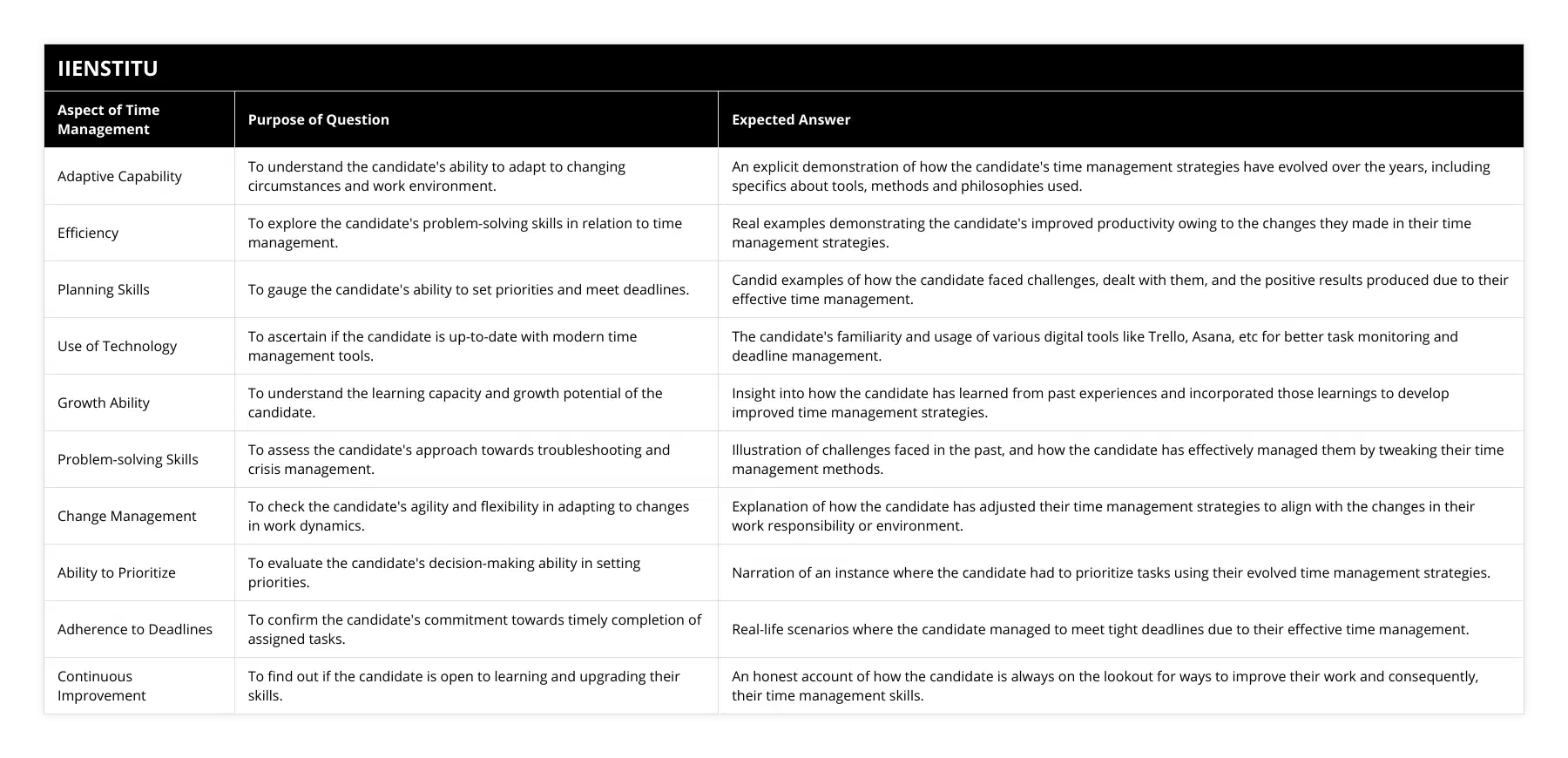
One of the most significant shifts in my time management philosophy has been the realization that it's not just about getting things done, but about getting the right things done. As author and productivity expert Peter Drucker once said, "Efficiency is doing things right; effectiveness is doing the right things" (Drucker, 1967). This insight has guided me to focus not just on completing tasks quickly, but on ensuring that my time and energy are directed towards the most impactful and meaningful work.
Another key lesson I've learned is the importance of setting boundaries and practicing self-care. In the early days of my career, I often fell into the trap of overworking, sacrificing personal time and well-being in the pursuit of productivity. However, I've come to understand that sustainable success requires a balance between work and rest. By setting clear boundaries, prioritizing self-care activities, and taking regular breaks, I've been able to maintain a healthier and more productive relationship with time management.
Looking back, I can see how my time management strategies have evolved from simple to-do lists to more sophisticated frameworks and digital tools. Each step in this journey has been a response to the changing demands of my work and the broader shifts in the professional landscape. As I continue to grow and face new challenges, I remain committed to adapting and refining my approach, always seeking ways to optimize my time and deliver the best possible results.
In conclusion, the evolution of my time management strategies over the years has been a testament to the power of continuous learning, adaptability, and a willingness to embrace change. By staying open to new ideas, experimenting with different techniques, and leveraging the latest tools and technologies, I have been able to navigate the complexities of the modern workplace and achieve greater levels of productivity and success. As I move forward in my career, I am excited to continue this journey of growth and discovery, always striving to find new and better ways to manage my time and make the most of every moment.
References:
1- Covey, S. R. (1989). The 7 Habits of Highly Effective People: Powerful Lessons in Personal Change. Simon & Schuster.
2- Drucker, P. F. (1967). The Effective Executive. HarperBusiness.
3- Allen, D. (2001). Getting Things Done: The Art of Stress-Free Productivity. Penguin Books.
4- Newport, C. (2016). Deep Work: Rules for Focused Success in a Distracted World. Grand Central Publishing.
5- Cirillo, F. (2018). The Pomodoro Technique: The Acclaimed Time Management System That Has Transformed How We Work. Currency.
6- Tracy, B. (2007). Time Power: A Proven System for Getting More Done in Less Time Than You Ever Thought Possible. AMACOM.
7- Knapp, J., Zeratsky, J., & Kowitz, B. (2016). Sprint: How to Solve Big Problems and Test New Ideas in Just Five Days. Simon & Schuster.
8- McChesney, C., Covey, S., & Huling, J. (2012). The 4 Disciplines of Execution: Achieving Your Wildly Important Goals. Free Press.
9- Vanderkam, L. (2010). 168 Hours: You Have More Time Than You Think. Portfolio.
10- Pash, A., & Trapani, G. (2011). Lifehacker: The Guide to Working Smarter, Faster, and Better. Wiley.
Frequently Asked Questions
How do you prioritize tasks when you have a tight deadline?
When faced with tight deadlines, I prioritize tasks based on their urgency and importance. I start by making a list of all the tasks that need to be completed and then categorize them based on their level of priority.
Urgency and Importance
I determine which tasks are the most critical and need to be completed immediately. These are usually tasks that have a significant impact on the project's success or failure. I also consider the consequences of not completing a task on time, such as missed opportunities or lost revenue.
Breaking Down Tasks
Next, I break down larger tasks into smaller, more manageable subtasks. This helps me to focus on one thing at a time and avoid feeling overwhelmed. I set realistic deadlines for each subtask and make sure to communicate them clearly with my team.
Flexibility and Adaptability
I remain flexible and adaptable throughout the process. Sometimes unexpected issues arise that require me to adjust my priorities on the fly. I stay calm under pressure and focus on finding solutions rather than dwelling on problems.
Collaboration and Communication
Finally, I believe in the power of collaboration and communication. I keep my team informed of my progress and any challenges I encounter along the way. I'm not afraid to ask for help when I need it, and I'm always willing to lend a hand to my colleagues when they need support.
By following these strategies, I'm able to effectively prioritize tasks and meet tight deadlines without compromising on quality. It's a skill I've developed over years of experience, and one that I believe is essential for success in any fast-paced work environment.
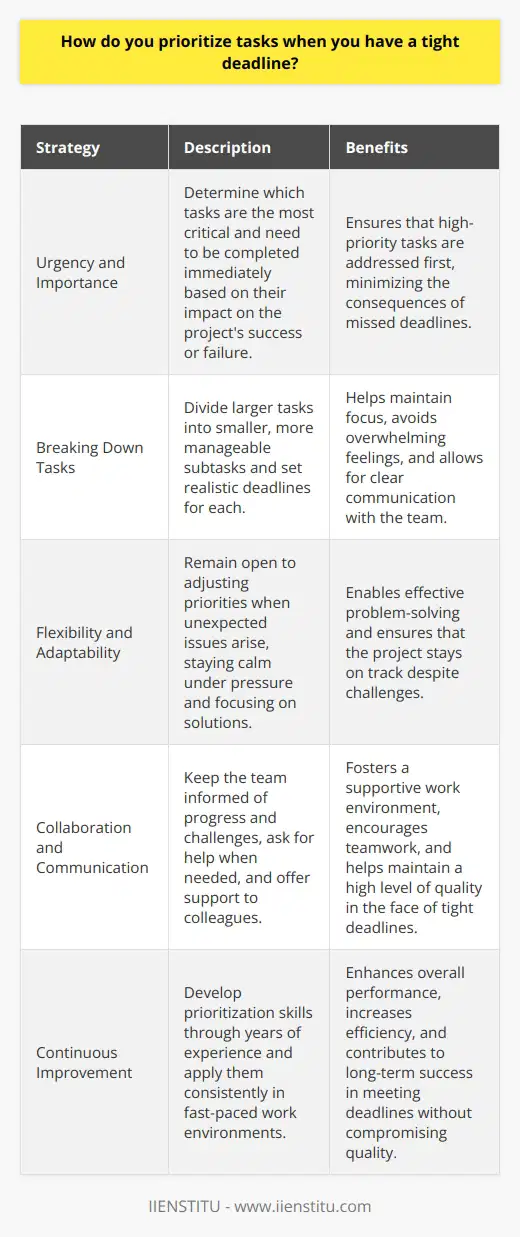
What techniques do you use to stay organized and focused?
I use a combination of techniques to stay organized and focused in my work. First and foremost, I rely on my trusty planner to keep track of all my tasks and deadlines. Every morning, I take a few minutes to review my schedule for the day and prioritize my to-do list.
Breaking Down Projects
When it comes to larger projects, I break them down into smaller, manageable chunks. This helps me avoid feeling overwhelmed and ensures that I'm making steady progress. I set mini-deadlines for each stage of the project to keep myself accountable.
Minimizing Distractions
To maintain my focus, I try to minimize distractions as much as possible. I silence my phone notifications and close unnecessary tabs on my computer. If I'm working on a particularly challenging task, I'll sometimes use the Pomodoro Technique - working in 25-minute intervals with short breaks in between.
Staying Motivated
I find that staying motivated is key to remaining focused. I like to set small rewards for myself when I complete a task or reach a milestone. It could be something as simple as taking a quick walk outside or treating myself to a favorite snack.
Adapting to Change
Of course, even the best-laid plans can go awry. I've learned to be flexible and adapt to changing circumstances. If an unexpected issue arises, I take a deep breath, reassess my priorities, and adjust my plan accordingly.
At the end of the day, staying organized and focused is all about finding what works for you. Through trial and error, I've developed a system that helps me stay on top of my responsibilities and deliver high-quality work.
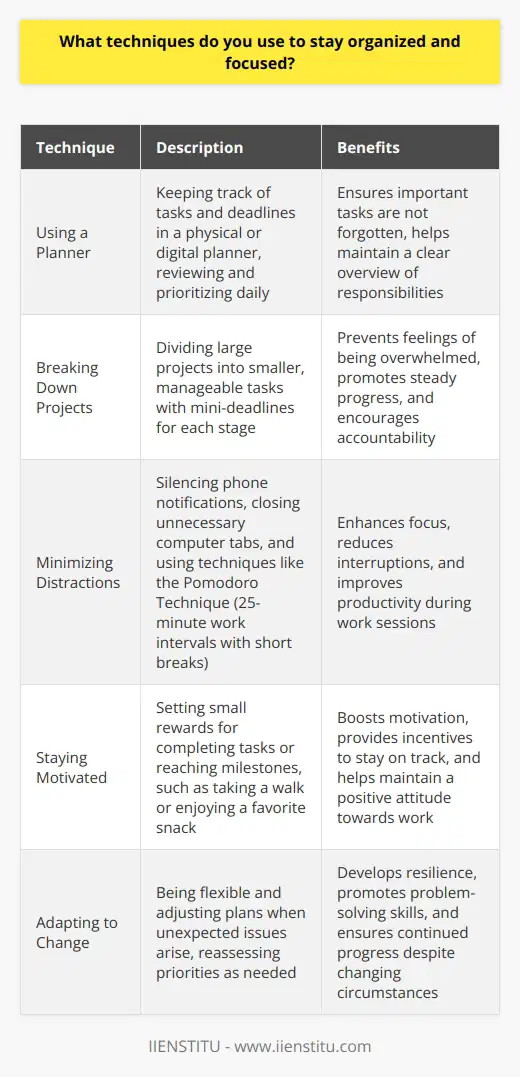
How do you handle interruptions or unexpected changes to your schedule?
When unexpected changes or interruptions arise, I take a proactive approach to adapt and prioritize effectively. I quickly assess the situation and determine the most critical tasks that need immediate attention. By focusing on these high-priority items first, I ensure that important deadlines and commitments are met.
Staying Organized and Flexible
To handle schedule disruptions, I rely on my strong organizational skills and flexibility. I keep a well-maintained calendar and to-do list, which allows me to easily adjust my plans when necessary. If an unexpected meeting or task comes up, I swiftly reorganize my schedule to accommodate the change while still making progress on my existing responsibilities.
Communicating Effectively
Clear communication is key when dealing with interruptions or changes. I make sure to keep my team and stakeholders informed about any adjustments to my schedule or priorities. By maintaining open lines of communication, I can manage expectations, coordinate efforts, and ensure everyone is on the same page.
Staying Calm and Focused
In the face of unexpected challenges, I remain calm and focused. I understand that interruptions are a normal part of any job, so I approach them with a positive attitude and a solution-oriented mindset. By staying level-headed and concentrating on finding effective solutions, I can navigate through disruptions without letting them derail my productivity or performance.
Ultimately, my ability to handle interruptions and adapt to changing circumstances has helped me thrive in dynamic work environments. I see each unexpected situation as an opportunity to demonstrate my resilience, problem-solving skills, and commitment to delivering high-quality results, no matter what challenges come my way.
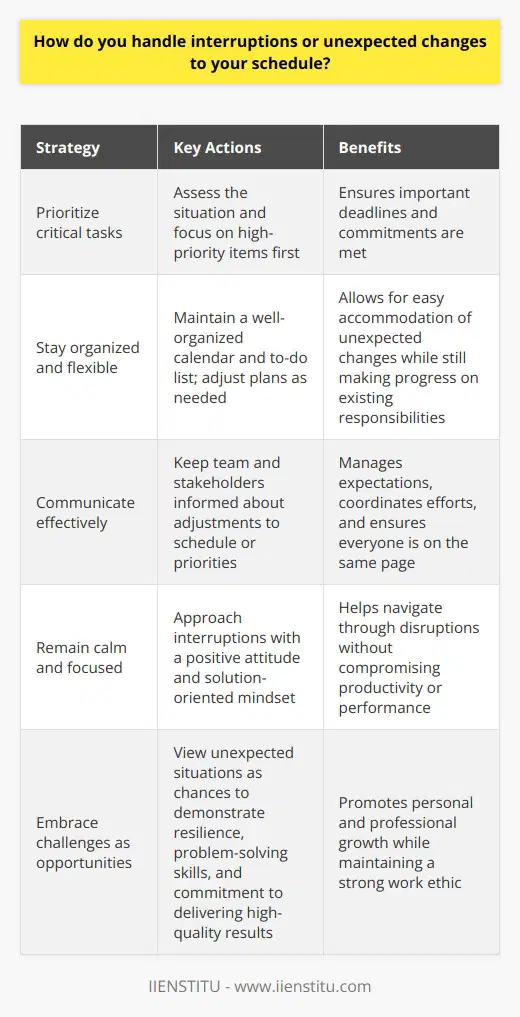
What tools or technology do you rely on to manage your time effectively?
I rely on a combination of digital tools and traditional methods to effectively manage my time. My smartphone is always with me, and I use its calendar app to schedule appointments, set reminders, and create to-do lists. This helps me stay organized and on top of my commitments.
In addition to my phone, I also use a physical planner to jot down notes, brainstorm ideas, and plan out my week. Writing things down by hand helps me remember them better and ensures I don't miss anything important.
Prioritizing Tasks
To make the most of my time, I prioritize my tasks based on urgency and importance. I tackle the most critical and time-sensitive items first, then move on to less pressing matters. This strategy helps me avoid procrastination and ensures I'm making progress on my goals.
Minimizing Distractions
When I need to focus on a project, I use website and app blockers to minimize distractions like social media and email notifications. I've found that by creating a distraction-free environment, I can work more efficiently and produce better results in less time.
Adapting to Change
Of course, even the best-laid plans can go awry, so I've learned to be flexible and adapt to changing circumstances. If an unexpected task arises or a meeting runs long, I adjust my schedule accordingly and communicate any changes to my team.
By using a mix of digital tools, traditional methods, and effective strategies, I'm able to manage my time well and achieve my goals. It's an approach that has served me well both personally and professionally.
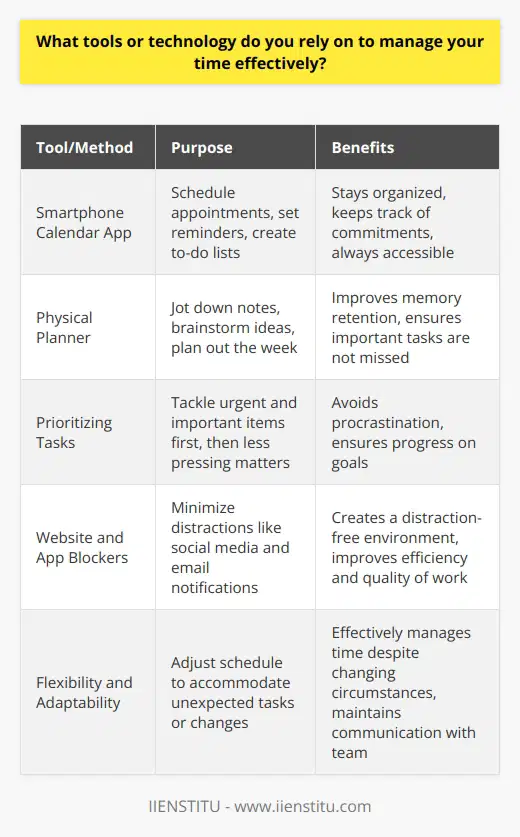
How do you balance short-term and long-term goals in your time management?
When it comes to balancing short-term and long-term goals in my time management, I've found that the key is to have a clear understanding of my priorities and to be flexible in my approach.
Prioritizing Tasks
I start by identifying the most critical tasks that align with my long-term objectives. These are the projects that I know will have the greatest impact on my career and personal growth. I make sure to allocate sufficient time and resources to these high-priority items, even if it means saying no to some short-term opportunities.
Breaking Down Long-Term Goals
At the same time, I recognize that long-term goals can feel overwhelming and distant. To make them more manageable, I break them down into smaller, actionable steps that I can work on in the short term. This helps me maintain momentum and ensures that I'm consistently making progress towards my bigger objectives.
Staying Flexible
Of course, life is unpredictable, and sometimes unexpected tasks or opportunities arise that require immediate attention. When this happens, I try to be flexible and adjust my priorities as needed. I'll shift my focus to address the most pressing issues, while still keeping my long-term goals in mind.
Regular Review and Reflection
To ensure that I'm staying on track, I regularly review my progress and reflect on my time management strategies. I ask myself questions like, "Am I allocating my time effectively?" and "Are there any areas where I can improve my efficiency?" By constantly evaluating and adapting my approach, I'm able to strike a healthy balance between short-term and long-term goals.
At the end of the day, it's all about being intentional with my time and staying focused on what matters most. By prioritizing my long-term objectives, breaking them down into manageable steps, and staying flexible in the face of unexpected challenges, I'm able to effectively balance my short-term and long-term goals and achieve success both personally and professionally.
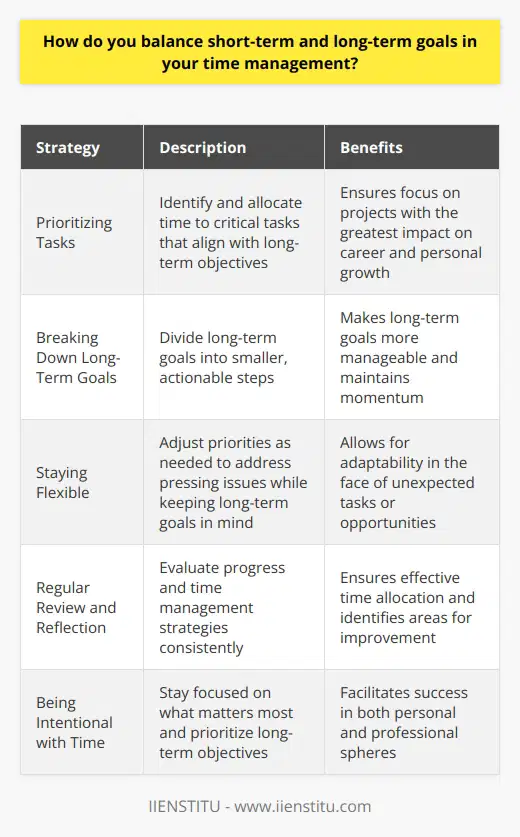
How do you determine what tasks are most important and urgent?
When determining which tasks are most important and urgent, I consider several factors. First, I assess the potential impact of each task on the company's goals and objectives. Tasks that directly contribute to achieving critical milestones or deliverables are given higher priority.
Next, I evaluate the deadlines associated with each task. Those with imminent due dates are considered more urgent and are tackled first. However, I also take into account the complexity and duration of each task to ensure that I allocate sufficient time for completion without compromising quality.
Balancing Priorities
It's essential to strike a balance between importance and urgency. Sometimes, tasks that seem urgent may not be as critical to the overall success of the project or company. In such cases, I prioritize tasks that have a more significant long-term impact, even if they don't have a pressing deadline.
Effective Communication
I believe in maintaining open communication with my team members and supervisor. Regular check-ins help me stay aligned with the team's priorities and make any necessary adjustments to my task list. If I encounter conflicting priorities or need guidance on which tasks to focus on, I proactively seek input from my manager to ensure that I'm directing my efforts in the most valuable way.
Adaptability and Flexibility
In a dynamic work environment, priorities can shift unexpectedly. I remain adaptable and willing to reassess my task list as needed. If an urgent issue arises that requires immediate attention, I quickly re-prioritize my tasks to address the most critical matters first.
By combining careful analysis, effective communication, and a flexible approach, I ensure that I consistently focus on the most important and urgent tasks, ultimately driving the success of the projects and the company as a whole.
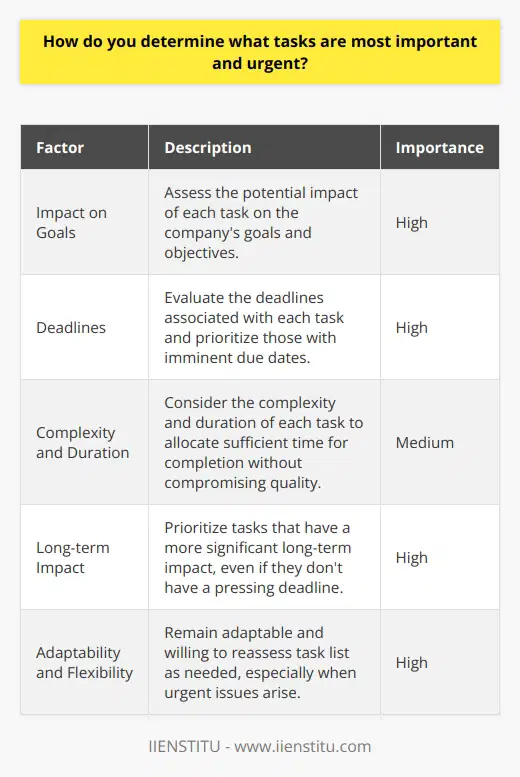
How do you avoid procrastination and stay motivated?
I stay motivated and avoid procrastination through a combination of techniques. First, I break down large tasks into smaller, manageable steps. This helps me feel less overwhelmed and more in control.
Set Clear Goals and Priorities
Every morning, I review my goals and prioritize my tasks for the day. I focus on the most important and urgent items first. Having a clear plan keeps me focused and motivated.
Use Time-Blocking
I schedule specific blocks of time for each task on my calendar. During those designated times, I eliminate distractions like social media and emails. Knowing I have a limited time pushes me to concentrate and work efficiently.
Take Regular Breaks
I've learned that short breaks actually boost my productivity and motivation. Every hour or so, I step away from my desk for 5-10 minutes. I stretch, grab a healthy snack, or chat with a colleague. These mini-breaks refresh my mind and help prevent burnout.
Surround Myself with Positive People
I'm fortunate to have supportive co-workers who encourage me. We celebrate each other's successes and help problem-solve challenges. Their positive energy is contagious and keeps me going even when I feel stuck.
Embrace Imperfection
As a recovering perfectionist, I've realized that striving for perfection often leads to procrastination. Now, I aim for excellence rather than perfection. I remind myself that done is better than perfect. Letting go of unrealistic expectations allows me to make consistent progress.
By implementing these strategies consistently, I'm able to stay motivated, overcome procrastination, and achieve my goals. It's an ongoing process, but each day I'm becoming more productive and resilient.
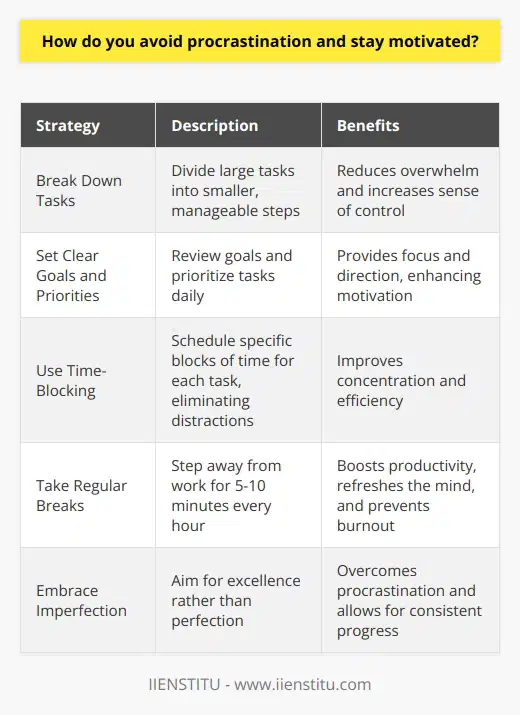
What strategies do you use to break down large projects into manageable tasks?
When tackling large projects, I break them down into smaller, manageable tasks. This approach helps me stay organized and focused, ensuring that I make steady progress towards the final goal.
Prioritizing Tasks
I start by identifying the most critical tasks and prioritizing them based on their importance and urgency. This allows me to tackle the most essential aspects of the project first, giving me a sense of accomplishment and momentum as I progress.
Setting Milestones
I set milestones for each phase of the project, which serve as checkpoints along the way. These milestones help me track my progress and ensure that I'm staying on schedule. They also provide opportunities to reassess and make adjustments if needed.
Breaking Down Tasks
I break down each task into smaller, actionable steps. This makes the tasks feel less overwhelming and more achievable. I find that this approach helps me maintain my motivation and focus, as I can see tangible progress with each completed step.
Collaborating with Others
When working on team projects, I collaborate closely with my colleagues. We discuss the project requirements, assign responsibilities, and establish clear lines of communication. Regular check-ins and updates help ensure that everyone is on the same page and that the project stays on track.
By employing these strategies, I've successfully completed numerous large projects in my previous roles. I find that breaking things down into smaller, manageable tasks keeps me organized, motivated, and consistently moving towards the desired outcome.
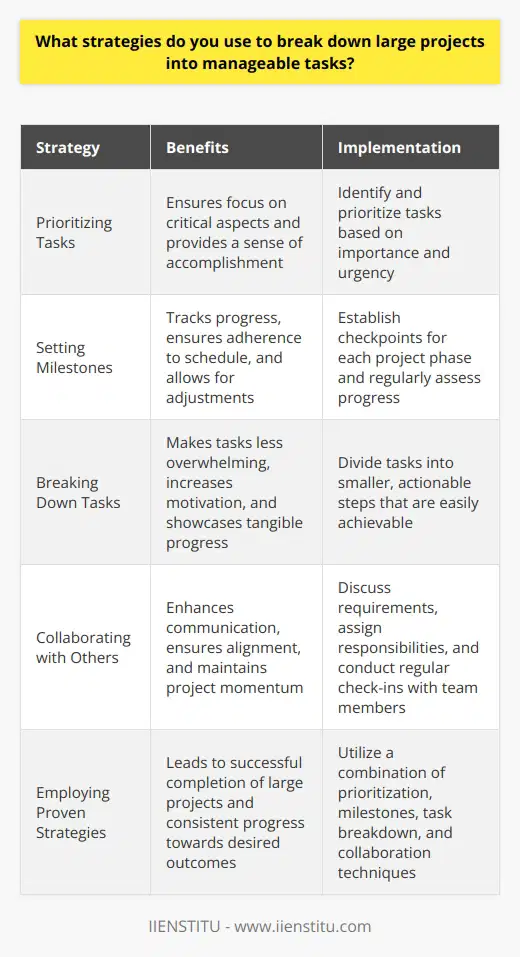
How do you handle multiple competing priorities?
Prioritizing Tasks Based on Urgency and Importance
Breaking Down Complex Projects into Manageable Steps
Communicating with Team Members and Stakeholders
Staying Organized with To-Do Lists and Time Blocking
Being Flexible and Adaptable
Continuously Improving Time Management Skills

How do you ensure that you meet deadlines consistently?
I have developed a strong work ethic and time management skills to consistently meet deadlines. This involves:
Prioritizing Tasks
I evaluate my workload and prioritize the most important and time-sensitive tasks first. This helps me focus my efforts where they're needed most.
Breaking Projects into Manageable Steps
For larger projects, I break them down into smaller, achievable milestones. This makes the work less overwhelming and allows me to make steady progress.
Setting Mini Deadlines
In addition to final due dates, I set my own interim deadlines for key deliverables. These mini deadlines keep me on track.
Communicating Proactively
If I foresee any challenges meeting a deadline, I communicate with my team and supervisor right away. Together, we can troubleshoot issues and adjust timelines if needed. Early communication is key.
Managing My Time Realistically
I'm careful not to overcommit myself. When taking on new projects, I assess my current workload to ensure I have the bandwidth to deliver quality work on time.
By employing these strategies, I'm able to manage my time effectively and consistently turn in assignments by their deadlines. I pride myself on being a reliable team member others can count on.
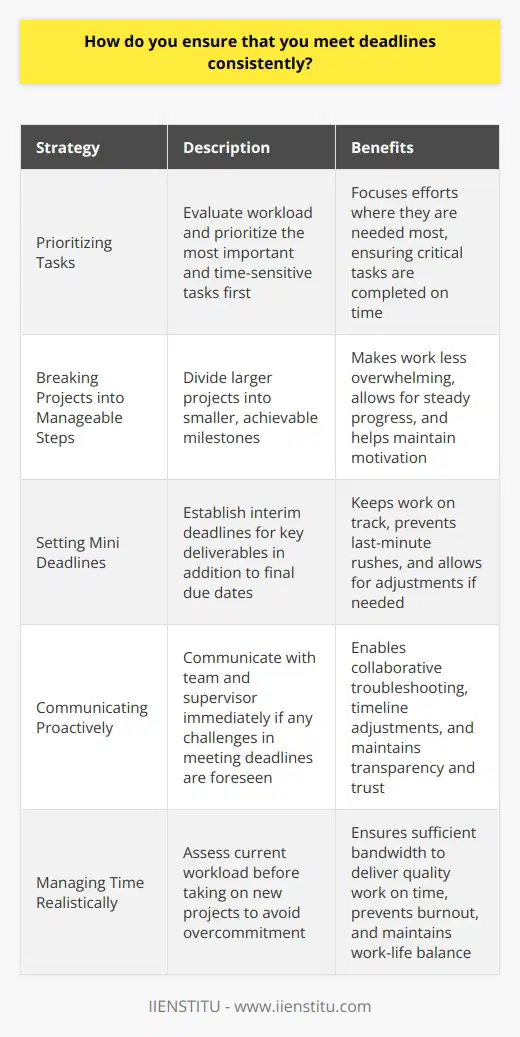
How do you allocate your time between work and personal life?
I believe in maintaining a healthy work-life balance, as it's essential for both personal well-being and professional success. Over the years, I've developed effective strategies to allocate my time efficiently between work and personal life.
Setting Clear Boundaries
I establish clear boundaries between my work and personal time. When I'm at work, I focus solely on my professional responsibilities, and when I'm off the clock, I dedicate my attention to personal matters, hobbies, and relationships.
Prioritizing Tasks
I prioritize my tasks based on their importance and urgency. This helps me tackle the most critical work-related tasks during my designated work hours, ensuring that I make the most of my time at the office.
Effective Time Management
I'm a firm believer in effective time management. I use tools like calendars, to-do lists, and productivity apps to plan my day, week, and month. This allows me to allocate sufficient time for both work and personal commitments.
Flexibility and Adaptability
I understand that unforeseen circumstances can arise, both in work and personal life. I remain flexible and adaptable, ready to adjust my schedule when necessary while still maintaining a healthy balance.
Communicating with Colleagues and Loved Ones
Open communication is key. I ensure that my colleagues are aware of my working hours and availability. Similarly, I communicate my work commitments to my loved ones, so they understand when I need to focus on my professional responsibilities.
By implementing these strategies, I've been able to successfully allocate my time between work and personal life, maintaining a healthy balance that allows me to thrive in both areas.
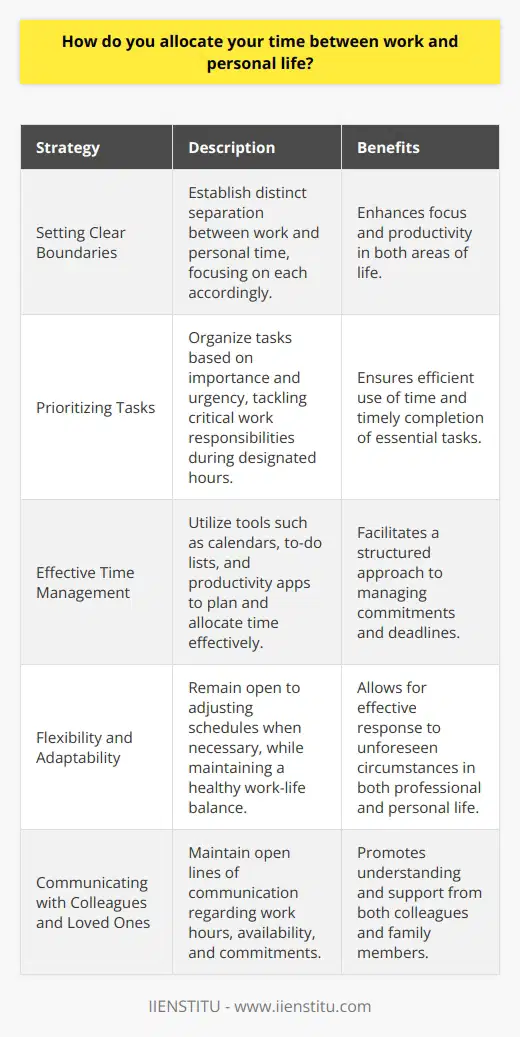
How do you handle stress when you're under time pressure?
When I'm under time pressure, I take a deep breath and prioritize my tasks. I focus on the most critical items first and break them down into smaller, manageable steps. This helps me stay organized and maintain a clear head.
Communicating with the Team
I also make sure to communicate openly with my team. If I'm feeling overwhelmed, I don't hesitate to ask for help or delegate tasks when appropriate. Collaboration is key to managing stress and meeting deadlines.
Staying Positive and Focused
Maintaining a positive attitude is crucial. I remind myself that the pressure is temporary and that I have the skills to handle it. Taking short breaks to stretch or do some deep breathing exercises can also help me recharge and refocus.
Learning from Experience
Over time, I've learned to anticipate potential stressors and plan accordingly. I create realistic timelines, build in buffers for unexpected issues, and regularly update my progress. By being proactive and adaptable, I can better manage stress under time constraints.
At the end of the day, I try to maintain perspective. While meeting deadlines is important, so is taking care of my well-being. By staying organized, communicating effectively, and maintaining a positive outlook, I can handle stress and deliver quality work, even under pressure.
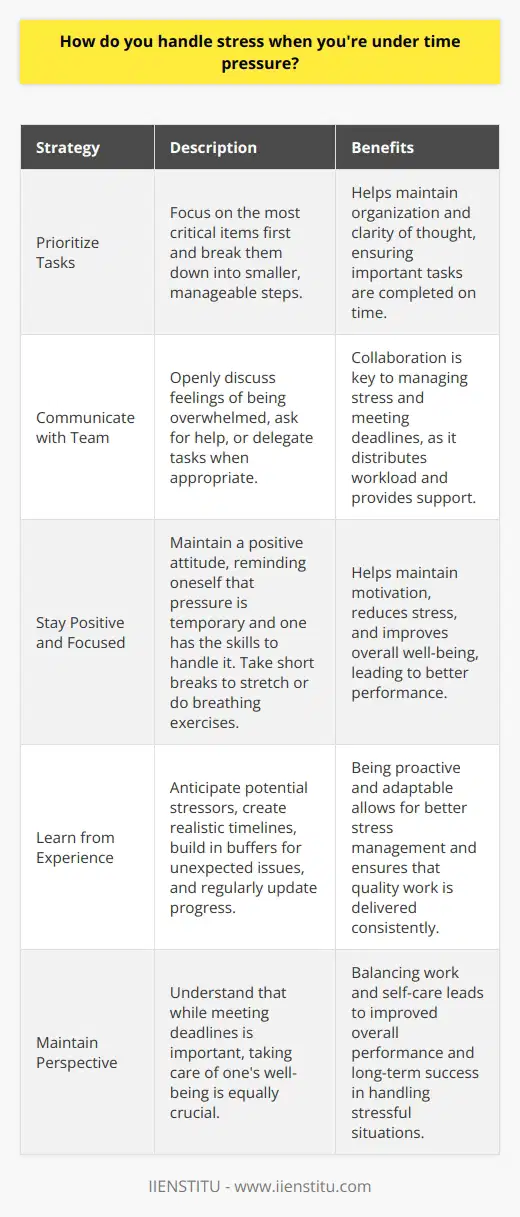
What have been the biggest challenges you've faced in managing your time?
One of the biggest challenges I've faced in managing my time has been learning to prioritize effectively. When I first started working, I often found myself getting bogged down in less important tasks and struggling to meet deadlines for critical projects.
Overcoming Perfectionism
I realized that part of the problem was my perfectionist tendencies. I would spend too much time trying to make every detail perfect, even on tasks that didn't require that level of attention. Learning to let go of perfectionism and focus on getting things done has been a game-changer for my productivity.
Setting Clear Goals
Another strategy that's helped me is setting clear goals and breaking them down into smaller, manageable tasks. By having a roadmap of what I need to accomplish, I can stay focused and avoid getting sidetracked by less important things.
Communicating with My Team
I've also learned the importance of communicating with my team and delegating when necessary. Trying to do everything myself was a recipe for burnout and missed deadlines. By working collaboratively and leveraging the strengths of my colleagues, we can achieve so much more together.
Continuously Learning and Adapting
Managing my time effectively is an ongoing process, and I'm always looking for ways to improve. Whether it's trying out a new productivity app or simply taking a few minutes each morning to plan out my day, I've found that small changes can make a big difference in my ability to stay on track and achieve my goals.
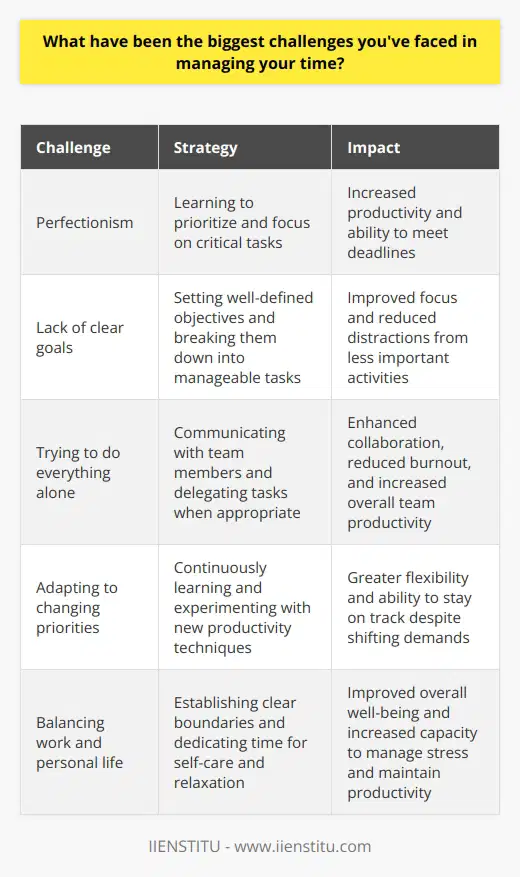
How do you adapt your time management strategies to different work environments?
I adapt my time management strategies to different work environments by first assessing the unique demands and challenges of each situation. This involves carefully observing the pace, deadlines, and expectations within the team or department.
Prioritizing Tasks
Once I have a clear understanding of the environment, I prioritize my tasks based on their urgency and importance. I create a daily or weekly to-do list, focusing on the most critical items that align with the team's goals.
Flexibility and Communication
I remain flexible and open to adjusting my plans as needed, especially when unexpected projects or issues arise. Clear communication with my colleagues and supervisor is key to ensuring that everyone is on the same page and that I'm directing my efforts where they're most needed.
Leveraging Technology
I also leverage various tools and technologies to streamline my work and boost efficiency. For instance, I use project management software to track deadlines, collaborate with team members, and stay organized across multiple projects.
Personal Example
In my previous role at a fast-paced startup, I had to adapt quickly to shifting priorities and tight deadlines. By staying organized, communicating proactively, and using time-tracking tools, I was able to consistently deliver high-quality work on time, even in a challenging environment.
Ultimately, the key to adapting my time management strategies is remaining agile, focused, and committed to delivering results, no matter the work environment.
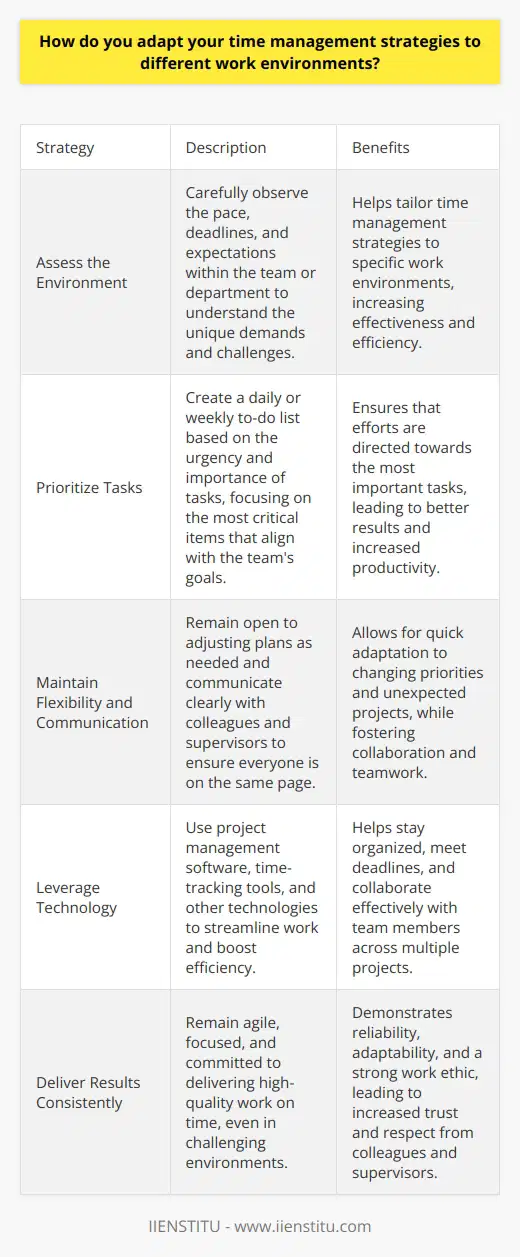
How do you handle tasks that you find tedious or uninteresting?
When faced with tedious or uninteresting tasks, I approach them with a positive attitude and a sense of purpose. I understand that every job has its share of mundane responsibilities, but I recognize their importance in contributing to the overall success of the company.
Breaking Down Tasks
To make tedious tasks more manageable, I break them down into smaller, achievable steps. This helps me stay focused and motivated, as I can see tangible progress along the way. I also set personal goals and deadlines to keep myself accountable and ensure timely completion.
Finding Ways to Improve Efficiency
When working on repetitive tasks, I actively look for ways to streamline processes and increase efficiency. Whether it's automating certain aspects of the job or developing a more organized system, I'm always seeking opportunities to work smarter, not harder.
Maintaining a Positive Mindset
I believe that a positive mindset is key to tackling uninteresting tasks. Rather than dwelling on the tediousness of the work, I focus on the value it brings to the company and how it contributes to my personal growth and skill development.
Seeking Learning Opportunities
Even in the most mundane tasks, I try to find learning opportunities. I ask myself what skills I can develop or refine through this work, and I approach it as a chance to expand my knowledge and capabilities.
In summary, I handle tedious tasks by breaking them down, seeking efficiency, maintaining a positive attitude, and embracing learning opportunities. By approaching uninteresting work with a growth mindset and a sense of purpose, I'm able to stay engaged and deliver quality results.
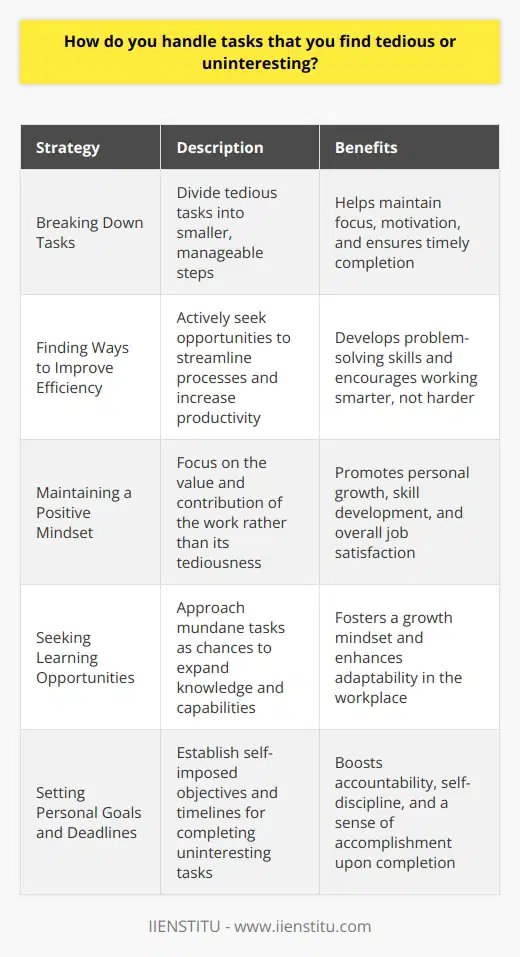
How do you stay productive during long work hours or overtime?
I stay productive during long work hours by focusing on my goals and breaking tasks into manageable chunks. When faced with overtime, I prioritize my to-do list and tackle the most important items first. This helps me maintain a sense of accomplishment and keeps me motivated.
Staying Energized and Focused
To keep my energy levels up, I make sure to take short breaks every hour or so. During these breaks, I'll stretch, grab a healthy snack, or chat with a coworker. These little moments of rest help me recharge and refocus on the tasks at hand.
Minimizing Distractions
I also try to minimize distractions as much as possible. This means closing unnecessary browser tabs, silencing my phone, and finding a quiet space to work if needed. By eliminating potential interruptions, I can focus more deeply on my work and get things done faster.
Collaborating with Colleagues
Another strategy I use is collaborating with my colleagues. When we're all working towards the same goal, it's easier to stay motivated and accountable. We'll check in with each other regularly, offer support and encouragement, and celebrate our successes along the way.
Maintaining Work-Life Balance
Finally, I believe in the importance of maintaining a healthy work-life balance. Even during busy periods, I make time for the things that matter most to me, like spending time with family and friends, exercising, and pursuing hobbies. By taking care of myself outside of work, I'm better equipped to handle the demands of my job and stay productive over the long term.
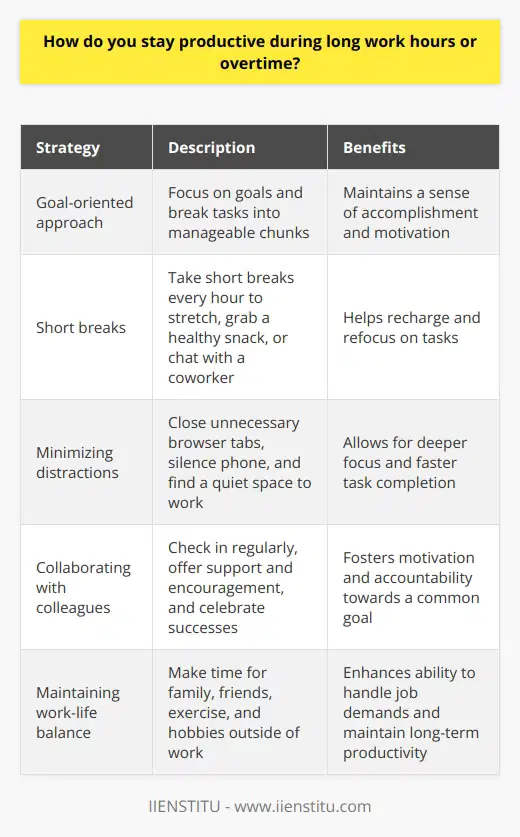
What techniques do you use to minimize distractions and stay focused?
When it comes to minimizing distractions and staying focused, I have a few tried-and-true techniques that work for me:
Prioritizing Tasks
I start each day by identifying the most critical tasks that need my attention. This helps me stay on track and avoid getting sidetracked by less important activities.
For example, when I was working on a tight deadline for a client project last month, I made sure to tackle the most challenging aspects first thing in the morning when my mind was fresh and focused.
Eliminating Digital Distractions
I'm a big believer in eliminating digital distractions. When I need to concentrate, I put my phone on silent, close unnecessary browser tabs, and use website blockers to prevent myself from mindlessly scrolling through social media.
It's not always easy, but I've found that this helps me stay in the zone and get more done in less time.
Taking Breaks
While it might seem counterintuitive, taking regular breaks is crucial for maintaining focus. I like to use the Pomodoro Technique, where I work for 25-minute intervals followed by short breaks.
During my breaks, I'll step away from my desk, stretch, or grab a quick snack. This helps me recharge and come back to my work with renewed energy and clarity.
Creating a Conducive Environment
Finally, I've learned that my physical environment plays a big role in my ability to focus. I try to work in a clean, organized space with plenty of natural light and minimal clutter.
If I'm working from home, I'll even light a candle or play some instrumental music to create a calming atmosphere that helps me stay centered and productive.
At the end of the day, staying focused is all about finding what works for you and being intentional with your time and energy. These techniques have helped me stay on track and achieve my goals, both personally and professionally.
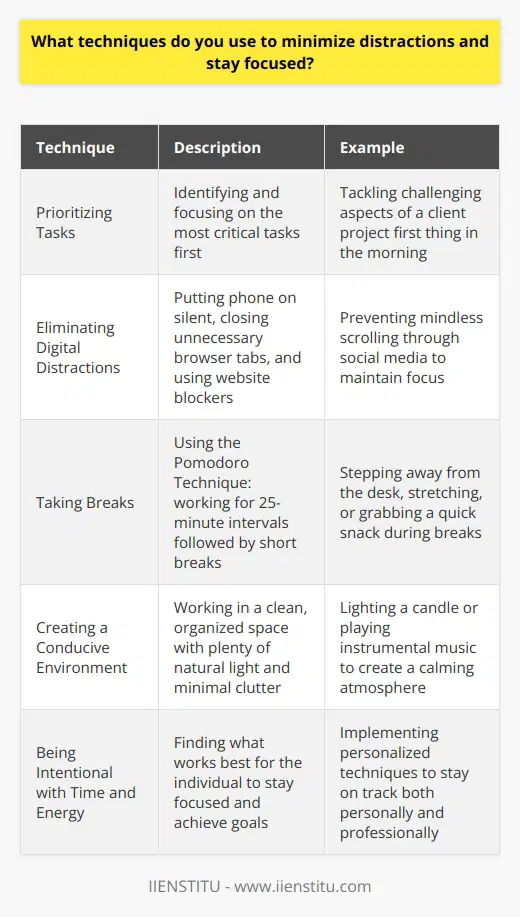
How do you handle team members who have different time management styles?
When working with team members who have different time management styles, I believe in open communication and finding common ground. In my experience, it's essential to understand each person's unique approach to deadlines and prioritization. By having candid discussions about our individual preferences, we can identify areas of alignment and potential challenges.
Strategies for Successful Collaboration
To ensure smooth collaboration, I take the initiative to clearly define project timelines and milestones. Breaking down tasks into manageable steps helps everyone stay on track, regardless of their time management style. I also find it helpful to set regular check-ins where we can assess progress, address any obstacles, and make necessary adjustments.
Adapting to Different Styles
Recognizing that some team members may prefer working well in advance while others thrive under pressure, I try to be flexible and accommodating. If a colleague needs more structure, I'm happy to provide detailed schedules and reminders. For those who enjoy autonomy, I trust them to manage their tasks independently while ensuring we meet collective deadlines.
Leading by Example
Ultimately, I believe in leading by example when it comes to time management. By consistently meeting my own commitments and communicating proactively, I aim to inspire others to do the same. When we work together towards a shared goal, respecting each other's time and efforts, we can achieve great results as a team.
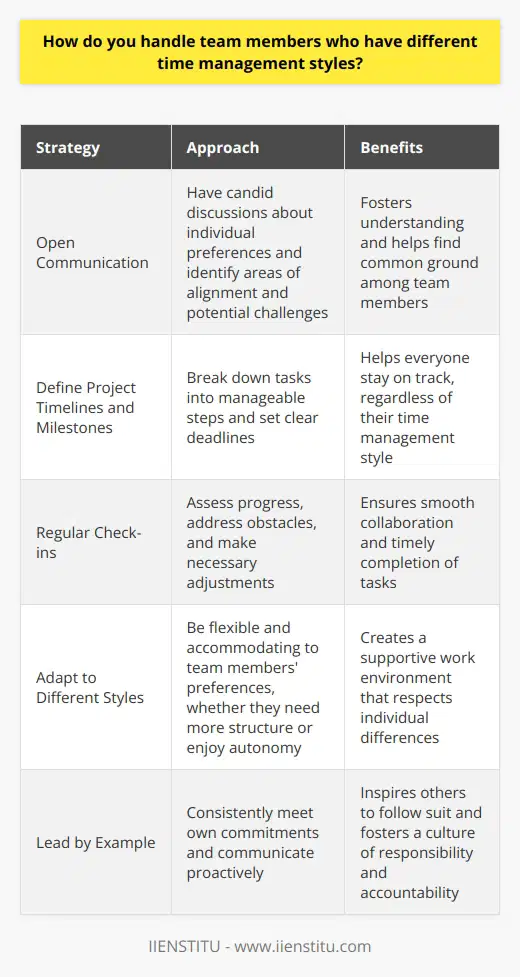
How do you ensure effective communication when managing your time?
When it comes to managing my time and ensuring effective communication, I rely on a few key strategies. First and foremost, I prioritize my tasks based on urgency and importance. This helps me focus on the most critical items and avoid getting bogged down in less essential matters.
Setting Clear Expectations
I've found that setting clear expectations upfront is crucial for effective communication. When working with colleagues or clients, I make sure to establish timelines, deliverables, and communication channels right from the start. This helps prevent misunderstandings and ensures everyone is on the same page.
Regular Check-Ins
To keep communication flowing smoothly, I schedule regular check-ins with my team. Whether it's a quick daily stand-up meeting or a weekly progress report, these touch points help keep everyone informed and aligned. I also make a point to be responsive to emails and messages, even if it's just to acknowledge receipt and provide an estimated response time.
Leveraging Technology
In today's fast-paced work environment, technology is a lifesaver when it comes to communication. I rely heavily on tools like Slack, Zoom, and project management software to stay connected with my team and keep projects on track. These tools allow for quick questions, updates, and collaboration without the need for lengthy meetings or email chains.
Active Listening
Finally, I believe active listening is key to effective communication. When someone comes to me with a question or concern, I make sure to give them my full attention. I ask clarifying questions, rephrase what I've heard to ensure understanding, and work towards finding a solution together. By showing empathy and respect for others' perspectives, I'm able to build strong relationships and foster open communication on my team.
At the end of the day, effective communication comes down to being organized, proactive, and empathetic. By prioritizing wisely, setting clear expectations, staying connected through technology, and practicing active listening, I'm able to manage my time effectively while ensuring nothing falls through the cracks communication-wise. It's not always easy striking that balance but with practice it becomes second nature!
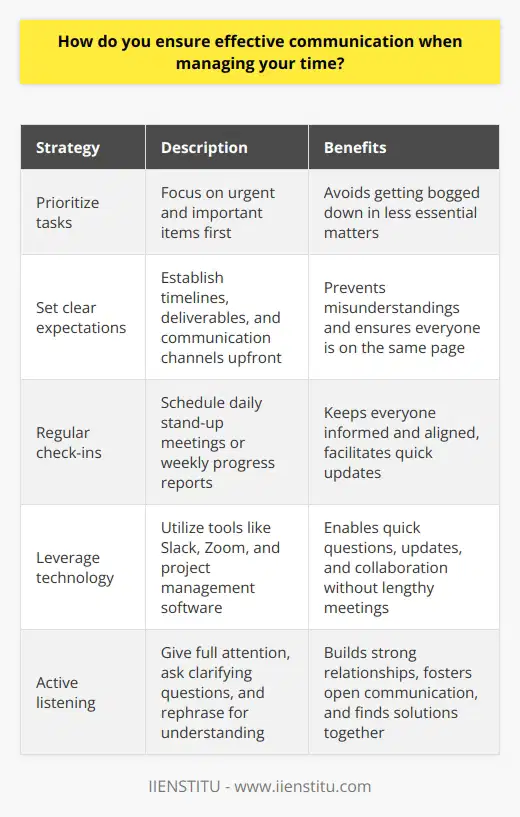
What role does delegation play in your time management strategies?
Delegation plays a crucial role in my time management strategies. As a leader, I recognize the importance of empowering my team members and leveraging their skills and expertise to achieve our goals efficiently.
Identifying Tasks to Delegate
I carefully assess the tasks on my plate and identify those that can be delegated to others. This allows me to focus on high-priority and strategic initiatives that require my direct attention.
Matching Tasks with Team Members
When delegating, I consider the strengths, interests, and development areas of my team members. By aligning tasks with their skills and aspirations, I ensure that they are motivated and well-equipped to deliver quality results.
Providing Clear Instructions and Expectations
To set my team up for success, I provide clear instructions, deadlines, and expectations when delegating tasks. I also make myself available for guidance and support throughout the process.
Monitoring Progress and Offering Feedback
While I trust my team to handle delegated tasks independently, I regularly check in on their progress. I offer constructive feedback, acknowledge their efforts, and celebrate their achievements along the way.
By effectively delegating tasks, I can optimize my time management and empower my team to grow and contribute meaningfully to our shared goals. It's a win-win approach that has proven invaluable in my leadership journey.
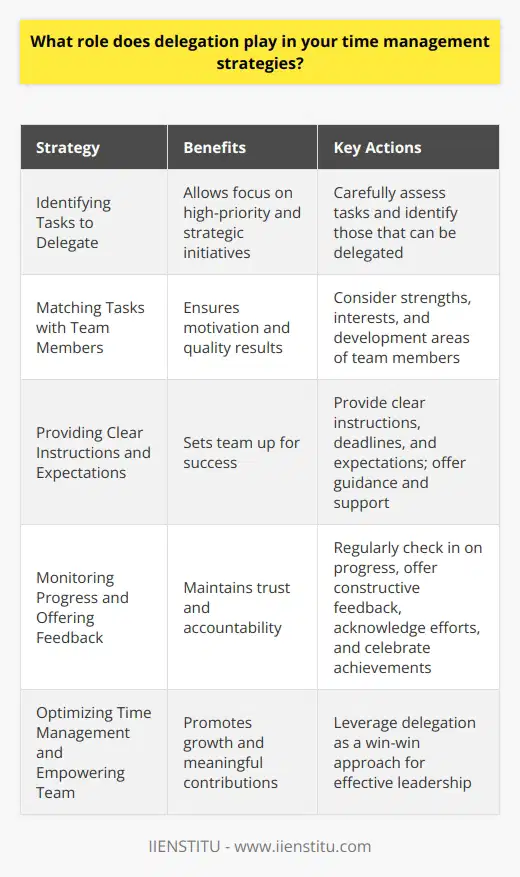
How do you handle situations where you've fallen behind schedule?
When faced with situations where I've fallen behind schedule, I take a proactive approach to get back on track. First, I prioritize my tasks and identify which ones are the most critical to complete. This helps me focus my efforts where they will have the greatest impact.
Communication is Key
I also make sure to communicate openly with my team and stakeholders about any delays. By keeping everyone informed, we can work together to adjust priorities and find solutions. I've found that transparency builds trust and understanding, even when things don't go as planned.
Learning from Experience
In my previous role, I once encountered an unexpected technical issue that set our project timeline back by a week. Rather than becoming overwhelmed, I took the lead in brainstorming workarounds with my team. We ended up dividing the remaining tasks more efficiently and putting in a few extra hours to make up for lost time.
Staying Positive and Focused
Throughout challenging situations, I try to maintain a positive attitude and focus on what I can control. I've learned that dwelling on setbacks only wastes valuable time and energy. Instead, I channel my efforts into finding solutions and moving forward.
Continuous Improvement
After any project or deadline, I take time to reflect on what went well and where I could improve. By learning from past experiences, I'm better equipped to anticipate potential roadblocks and proactively plan for them in the future. This helps me continuously improve my time management and problem-solving skills.
In summary, when falling behind schedule, I prioritize tasks, communicate openly, stay positive, and learn from the experience. By taking these steps, I'm able to get back on track while maintaining strong relationships with my team.
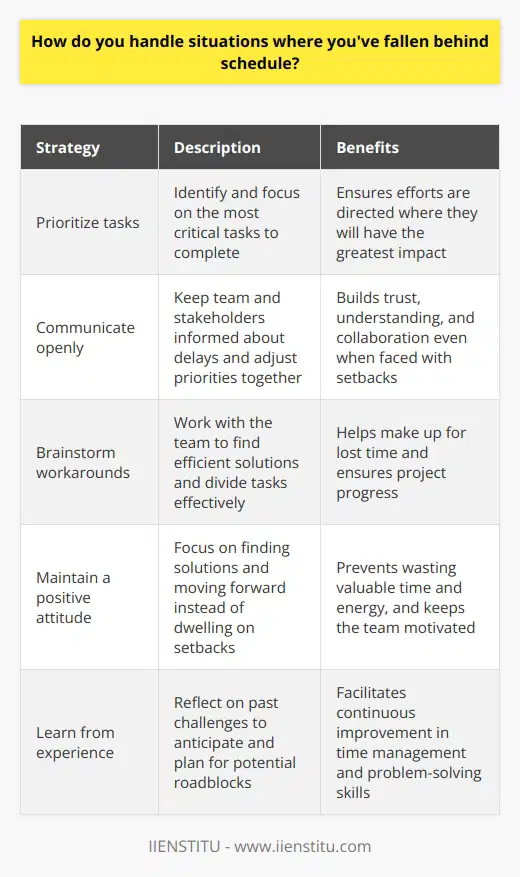
How do you continuously improve and refine your time management skills?
I continuously improve my time management skills by setting clear goals and prioritizing tasks. Every morning, I review my to-do list and identify the most critical items that require immediate attention. This helps me focus on what matters most and avoid getting sidetracked by less important activities.
Leveraging Technology
I leverage various productivity tools and apps to streamline my workflow and boost efficiency. For instance, I use calendar reminders to stay on top of deadlines and meetings. I also utilize project management software to collaborate with team members and track progress on complex projects.
Learning from Mistakes
Whenever I encounter challenges or setbacks in managing my time effectively, I take a step back and reflect on what went wrong. By identifying the root causes of my time management issues, I can develop strategies to overcome them in the future. This continuous learning process helps me refine my skills over time.
Seeking Feedback
I actively seek feedback from colleagues and supervisors on how I can improve my time management abilities. Their insights and suggestions provide valuable perspectives that I may have overlooked. By incorporating their feedback into my daily routines, I can make meaningful improvements to the way I manage my time.
Embracing Flexibility
While having a well-structured plan is crucial, I also understand the importance of being flexible. Unexpected situations can arise, and priorities may shift. By remaining adaptable and open to adjusting my schedule when necessary, I can effectively navigate changing circumstances without compromising my overall productivity.
Ultimately, improving my time management skills is an ongoing journey. By setting goals, leveraging technology, learning from mistakes, seeking feedback, and embracing flexibility, I continuously strive to optimize my time and deliver high-quality work consistently.
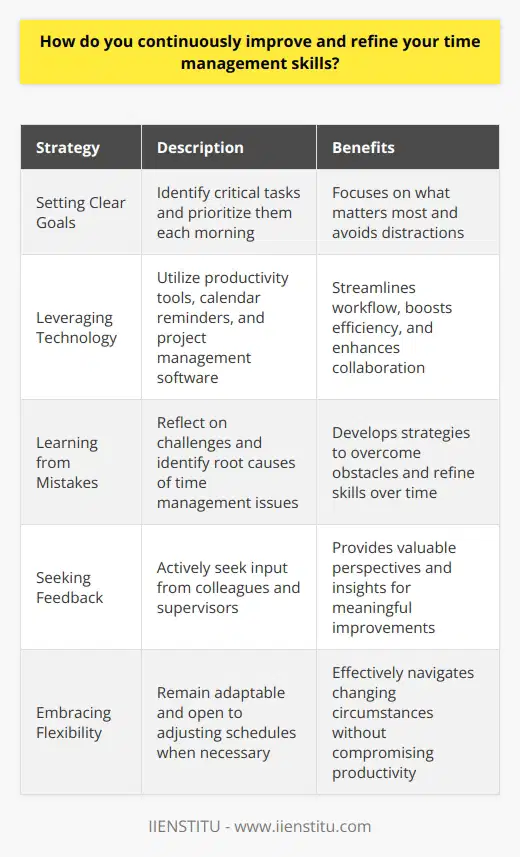
How do you prioritize self-care and avoid burnout?
Prioritizing self-care is essential for maintaining a healthy work-life balance and avoiding burnout. I believe in setting clear boundaries between my personal and professional life to ensure that I have time for activities that recharge me.
Making Time for Hobbies and Interests
One way I avoid burnout is by regularly engaging in hobbies and interests outside of work. For me, that means playing guitar, going for hikes on weekends, and trying out new recipes in the kitchen. These activities help me destress and approach work with renewed energy and focus.
Practicing Mindfulness and Stress-Reduction Techniques
I've also found mindfulness practices like deep breathing and meditation to be helpful in managing stress. If I'm feeling overwhelmed at work, I'll take a few minutes to close my eyes and focus on my breath. This helps me recenter myself and tackle challenges with a clearer mind.
Communicating with Colleagues and Supervisors
Open communication is key for avoiding burnout too. If my workload feels unmanageable, I don't hesitate to speak up and ask for support from my team or supervisor. By being proactive and honest about my capacity, I can work with others to find solutions and prevent reaching a breaking point.
At the end of the day, I believe self-care is about listening to your body and mind. When I prioritize activities that bring me joy and help me recharge, I'm better able to show up as my best self at work and beyond.
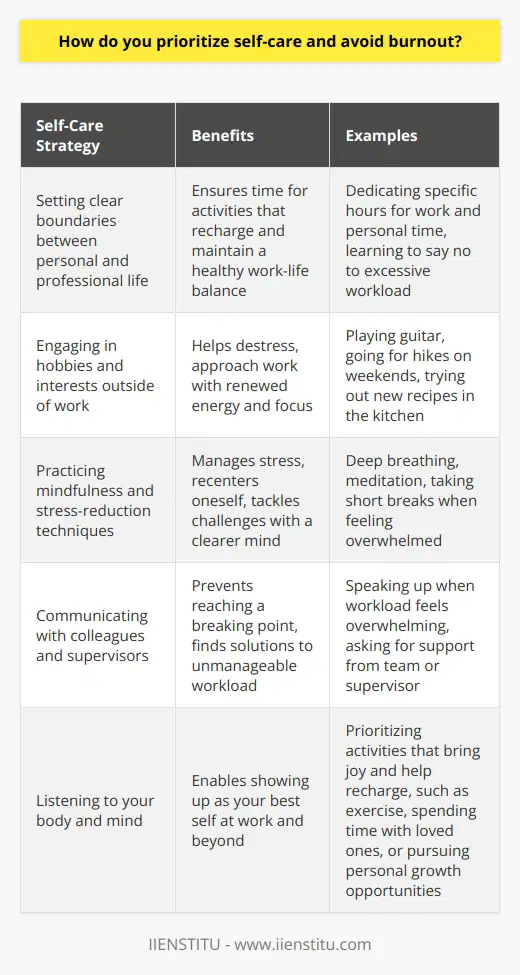
What strategies do you use to manage your energy levels throughout the day?
I have developed several strategies to effectively manage my energy levels throughout the day. These techniques help me stay focused, productive, and maintain a positive attitude in both my personal and professional life.
Prioritizing Sleep and Rest
Getting enough quality sleep is crucial for me. I aim for 7-8 hours each night and stick to a consistent sleep schedule. During the day, I take short breaks to stretch, walk around, or simply rest my eyes. These moments of rest help me recharge and prevent burnout.
Balanced Nutrition and Hydration
I pay attention to what I eat and drink. I start my day with a nutritious breakfast that includes protein and complex carbohydrates. Throughout the day, I have smaller, balanced meals and snacks to keep my energy levels stable. Staying hydrated is also key - I always have a water bottle with me and aim to drink at least 2 liters per day.
Physical Activity and Exercise
Regular exercise is a game-changer for me. I try to fit in at least 30 minutes of physical activity each day, whether it's a morning jog, a lunchtime yoga class, or an evening gym session. Exercise boosts my mood, improves my focus, and gives me sustained energy.
Mindfulness and Stress Management
I practice mindfulness techniques like deep breathing and meditation to manage stress and maintain a positive outlook. When I feel overwhelmed, I take a few minutes to close my eyes, breathe deeply, and recenter myself. This helps me approach challenges with a clear mind and renewed energy.
By prioritizing self-care and implementing these strategies, I am able to effectively manage my energy levels and bring my best self to work each day.
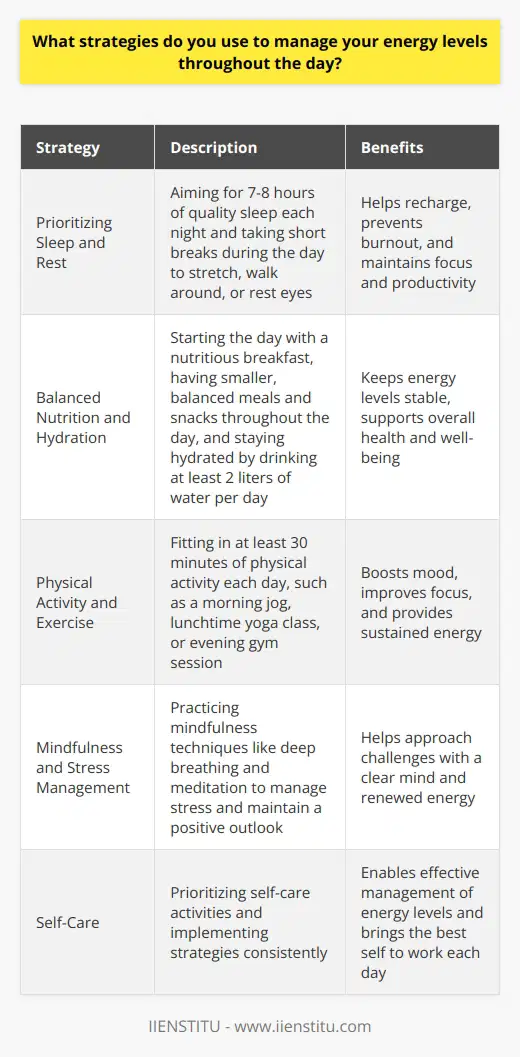
How do you handle conflicting deadlines from different stakeholders?
When dealing with conflicting deadlines from different stakeholders, I prioritize based on the overall impact on the company. I assess which tasks are most critical and align with the organization's goals. This helps me determine where to focus my efforts.
Open communication is key in these situations. I discuss the competing priorities with my manager and the stakeholders involved. Together, we come up with a plan that addresses everyone's needs as much as possible. We negotiate timelines and find ways to balance the workload.
Strategies for Managing Deadlines
Over the years, I've developed some effective strategies for handling multiple deadlines:
A Real-Life Example
In my previous role, I once had three major projects due the same week. The sales team needed updated product spec sheets, while the executives wanted a competitive analysis report. Meanwhile, my direct supervisor asked me to revamp the company's slide deck. It was overwhelming!
I sat down with each stakeholder to understand their priorities. The sales materials were essential for closing deals, so those took top billing. I explained the situation to my boss and the executives. We agreed I'd provide a preliminary analysis and final slide deck the following week. By communicating openly and prioritizing effectively, I met everyone's needs and expectations.
The Key Takeaway
Conflicting deadlines are a reality in any fast-paced business. The key is staying calm, communicating proactively, and focusing on what matters most. With the right strategies, it's possible to keep all the balls in the air and deliver exceptional results.
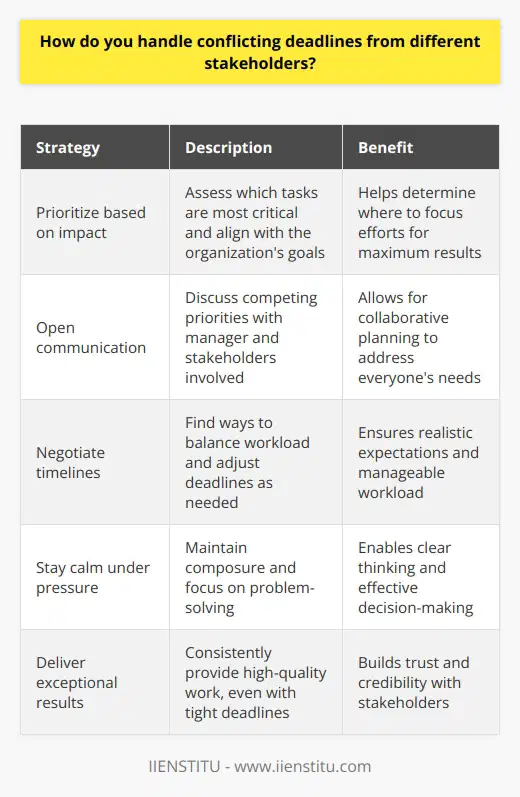
How do you manage your time when working on multiple projects simultaneously?
When managing my time on multiple projects, I prioritize tasks based on urgency and importance. I create a detailed schedule, allocating specific time slots for each project. This helps me stay focused and avoid overcommitting myself.
Communication is Key
I maintain open lines of communication with project stakeholders to ensure everyone is on the same page. Regular check-ins help identify potential roadblocks early on, allowing for timely adjustments to the plan.
Flexibility and Adaptability
I remain flexible and adaptable, ready to pivot when necessary. Sometimes, unexpected issues arise that require immediate attention. In these situations, I reassess my priorities and adjust my schedule accordingly, while still ensuring progress on all fronts.
Leveraging Technology
I leverage productivity tools like project management software and time tracking apps to stay organized and efficient. These tools help me visualize my workload, set reminders, and track my progress across multiple projects.
Self-Care and Balance
I recognize the importance of self-care and work-life balance. I make sure to take short breaks throughout the day to recharge and avoid burnout. This helps me maintain a fresh perspective and tackle challenges with renewed energy.
By implementing these strategies, I can effectively manage my time and deliver high-quality work on multiple projects simultaneously. It's a skill I've honed over years of experience, and I'm confident in my ability to juggle competing priorities without compromising on results.
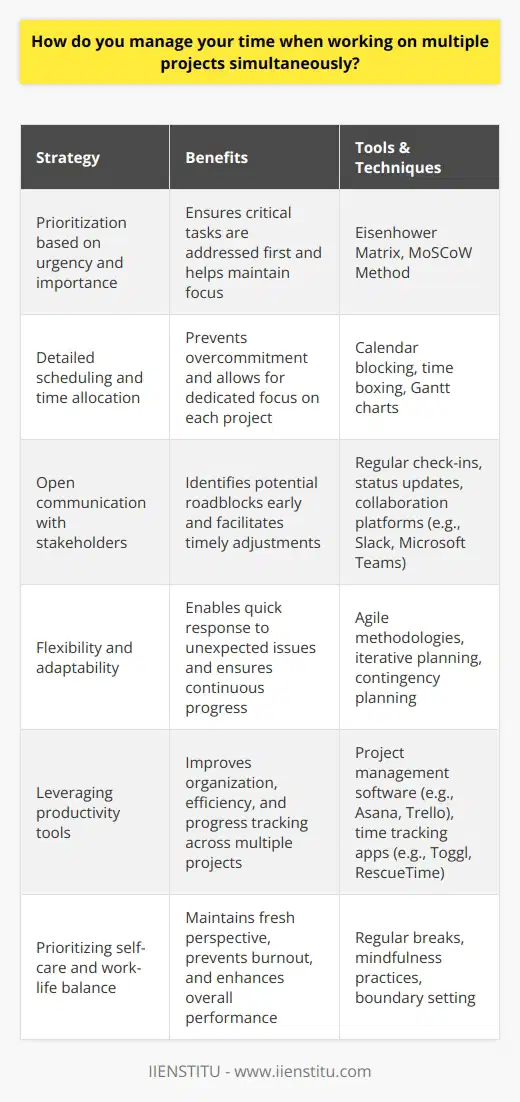
What techniques do you use to estimate the time required for tasks accurately?
When estimating the time required for tasks, I rely on a combination of techniques. First, I break down the task into smaller, manageable subtasks. This helps me understand the scope and complexity of the work involved.
Drawing from Past Experience
I draw from my past experiences with similar tasks to gauge how long each subtask might take. For example, when I was working on a website redesign project last year, I learned that gathering client requirements usually takes about 2-3 days. So, I use that as a reference point for future projects.
Adding Buffer Time
I always add some buffer time to account for unexpected challenges or delays. This has saved me countless times, like when I was working on a tight deadline and the client suddenly requested additional changes. Because I had built in some extra time, I was able to accommodate their request without missing the deadline.
Seeking Input from Colleagues
If I'm unsure about the time required for a specific subtask, I reach out to colleagues who have more experience in that area. Their insights help me refine my estimates. Just last week, I consulted with our senior developer to get a better understanding of how long it would take to implement a new feature on our platform.
Tracking Progress
As I work on the task, I constantly track my progress against my initial estimates. If I notice that something is taking longer than anticipated, I adjust my estimates for the remaining subtasks. This helps me provide accurate updates to my team and manage expectations.
By combining these techniques – breaking down tasks, drawing from past experiences, adding buffer time, seeking input from colleagues, and tracking progress – I'm able to estimate task durations with a high degree of accuracy. It's an iterative process that I'm continuously refining, but it has served me well in my professional life.
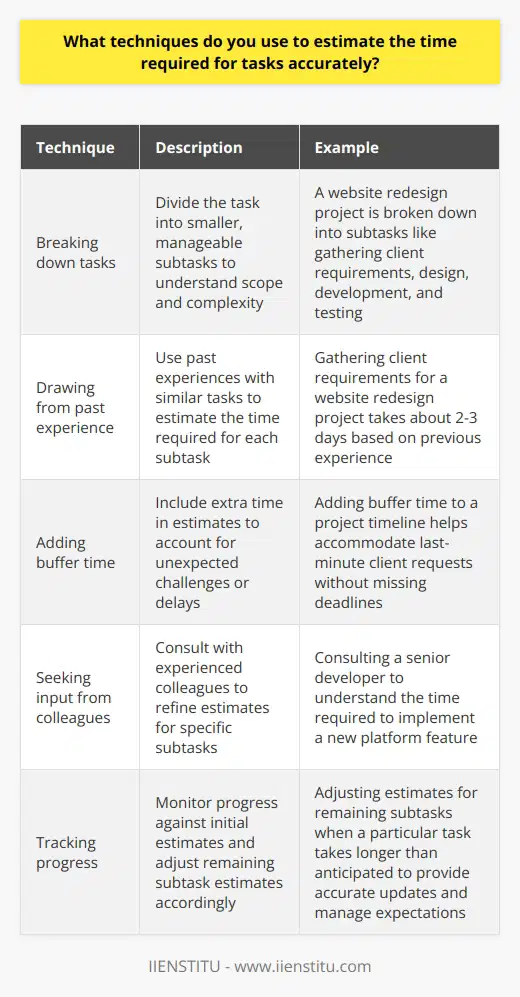
How do you handle procrastination when it arises?
Procrastination is a challenge that everyone faces from time to time. When it strikes, I take a step back and try to understand the underlying reasons behind my reluctance to start a task. Often, it stems from feeling overwhelmed or uncertain about where to begin.
Breaking Down Tasks
To overcome procrastination, I break down larger projects into smaller, more manageable steps. This makes the task feel less daunting and helps me build momentum. I prioritize the most important or challenging parts first, tackling them when my energy and focus are at their peak.
Setting Deadlines and Rewards
I find that setting self-imposed deadlines keeps me accountable and motivated. I also reward myself for completing tasks, whether it's taking a short break, indulging in a favorite hobby, or treating myself to something I enjoy. These incentives help me stay on track and push through procrastination.
Minimizing Distractions
Distractions are a common trigger for procrastination. To combat this, I create a focused work environment by silencing notifications, closing unnecessary tabs, and finding a quiet space to work. If I'm struggling to concentrate, I use techniques like the Pomodoro method, working in focused bursts with short breaks in between.
Embracing Imperfection
Perfectionism can be a significant barrier to starting tasks. I've learned to embrace the concept of "done is better than perfect." I remind myself that it's okay to make mistakes and that progress is more important than perfection. This mindset shift helps me overcome the fear of failure and take action.
By understanding my procrastination triggers, breaking tasks into manageable steps, setting deadlines and rewards, minimizing distractions, and embracing imperfection, I've developed effective strategies to handle procrastination when it arises. It's an ongoing process, but with practice and self-awareness, I've become better at staying productive and achieving my goals.
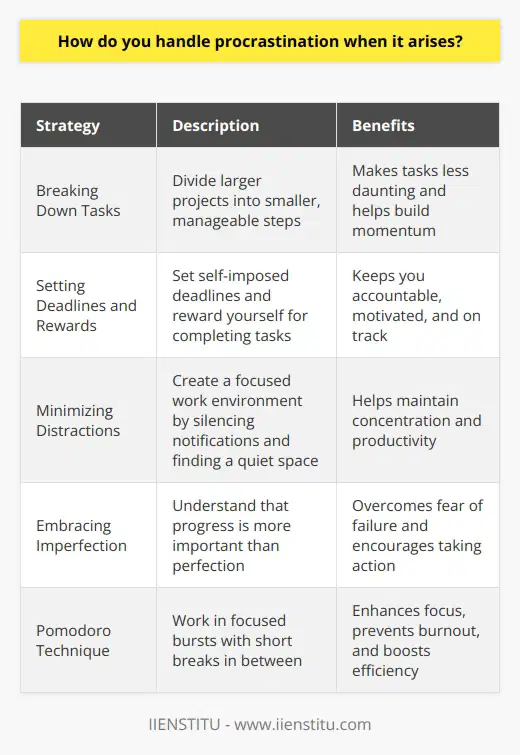
How do you stay organized when managing a heavy workload?
I stay organized when managing a heavy workload by prioritizing tasks and using various tools and techniques.
Prioritizing Tasks
I begin by assessing the urgency and importance of each task. I then create a to-do list, ranking items from highest to lowest priority. This helps me focus on the most critical tasks first.
Throughout the day, I revisit my to-do list and adjust priorities as needed. If a new urgent task arises, I reassess and reprioritize accordingly.
Using Tools and Techniques
I rely on several tools to keep myself organized. I use a digital calendar to schedule meetings, deadlines, and reminders. This ensures I don't overlook any important commitments.
For project management, I utilize software like Trello or Asana. These platforms allow me to break down projects into smaller, manageable tasks. I can set deadlines, assign responsibilities, and track progress all in one place.
I'm also a fan of the Pomodoro Technique. I work in focused 25-minute intervals, followed by short breaks. This helps me maintain concentration and avoid burnout when tackling a heavy workload.
Staying Flexible
Despite my best efforts to stay organized, unexpected challenges can arise. When they do, I try to remain flexible and adapt my approach as needed.
I communicate openly with my team and manager about any roadblocks or changes in priorities. By staying transparent and collaborative, we can work together to find solutions and keep projects moving forward.
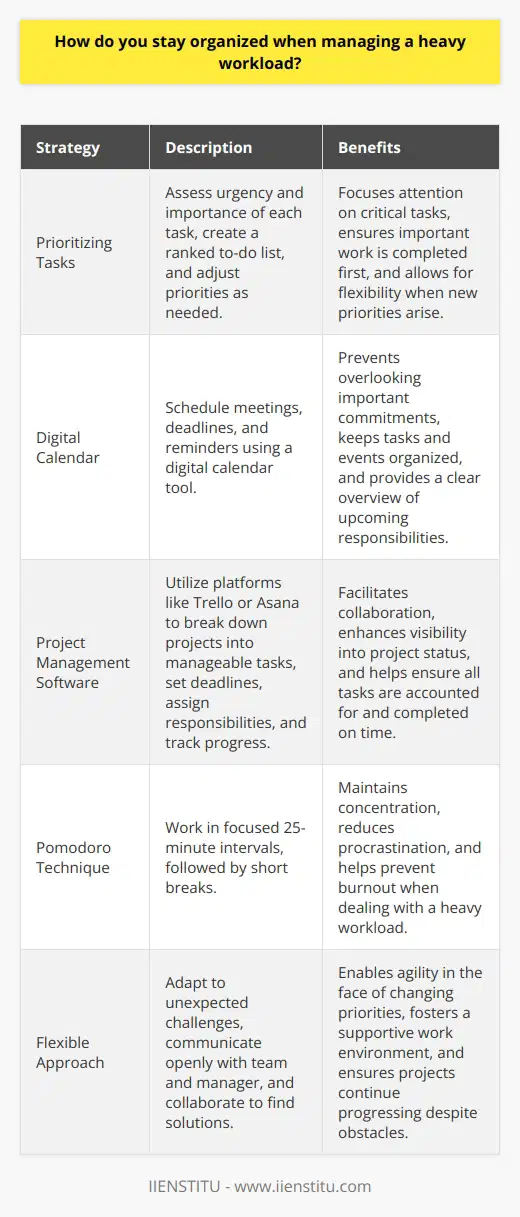
How do you ensure that you're using your time in the most productive way possible?
I ensure that I'm using my time productively by prioritizing tasks and setting clear goals for each day. Before starting work, I create a to-do list and rank items based on urgency and importance. This helps me focus on the most critical tasks first and avoid getting sidetracked by less crucial matters.
Time Blocking and Pomodoro Technique
To maximize efficiency, I use time blocking and the Pomodoro Technique. I dedicate specific chunks of time to individual tasks and work in focused 25-minute intervals, followed by short breaks. This approach keeps me engaged and prevents burnout, allowing me to maintain a steady pace throughout the day.
Regular Check-Ins and Adjustments
I also schedule regular check-ins with myself to assess my progress and make adjustments as needed. If I find that a particular task is taking longer than expected or isn't yielding the desired results, I reevaluate my approach and make changes to ensure that I'm using my time wisely.
Minimizing Distractions
Another key aspect of productivity is minimizing distractions. I turn off notifications on my phone and computer, and I create a quiet workspace conducive to concentration. When I need to focus intensely, I put on noise-canceling headphones and listen to instrumental music to block out external distractions.
Collaborative Productivity
Finally, I believe that collaboration can be a powerful tool for productivity. When working on team projects, I communicate regularly with my colleagues to ensure that we're all on the same page and working efficiently towards our shared goals. By leveraging each other's strengths and expertise, we can achieve more than we could individually.
